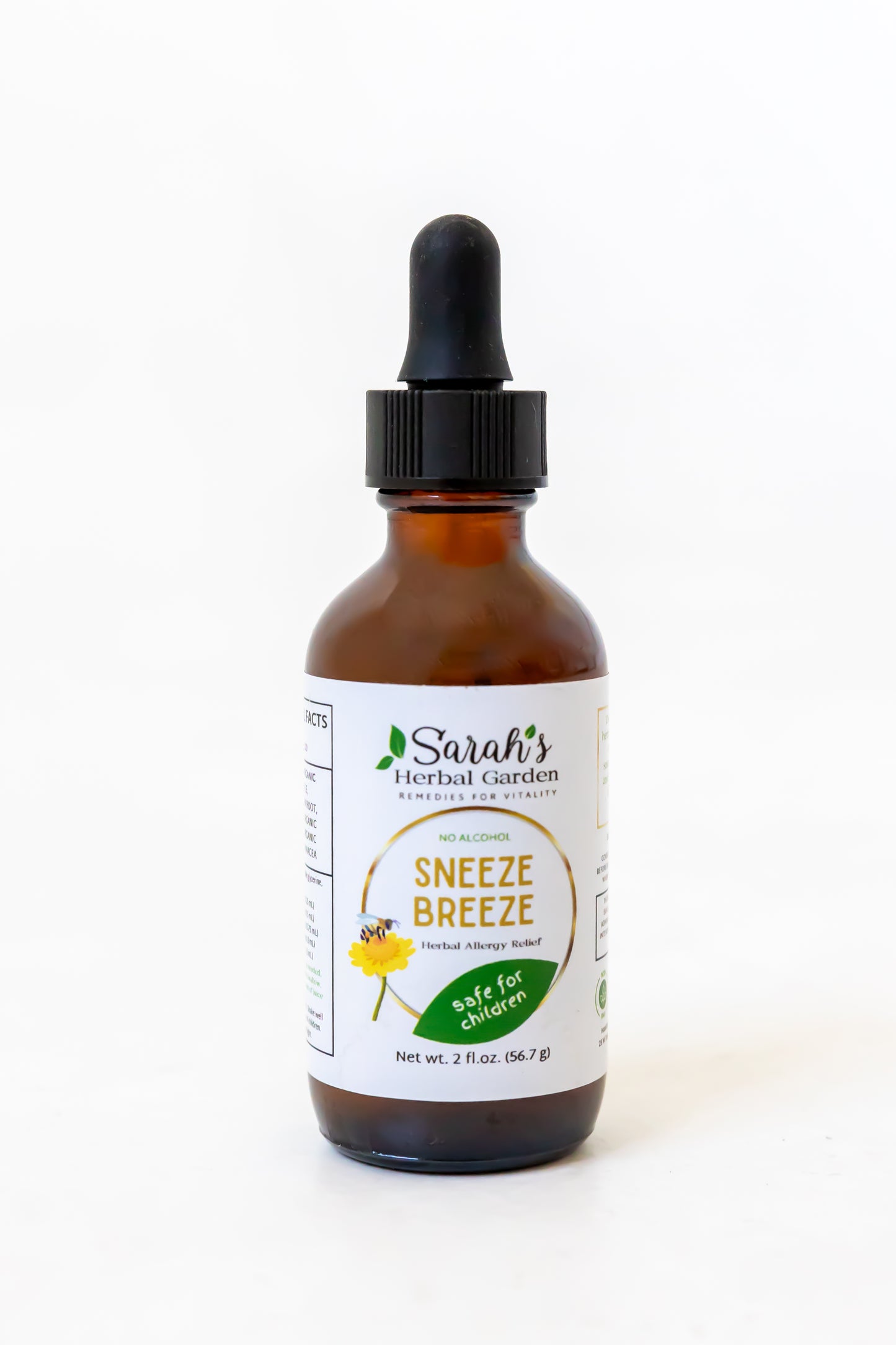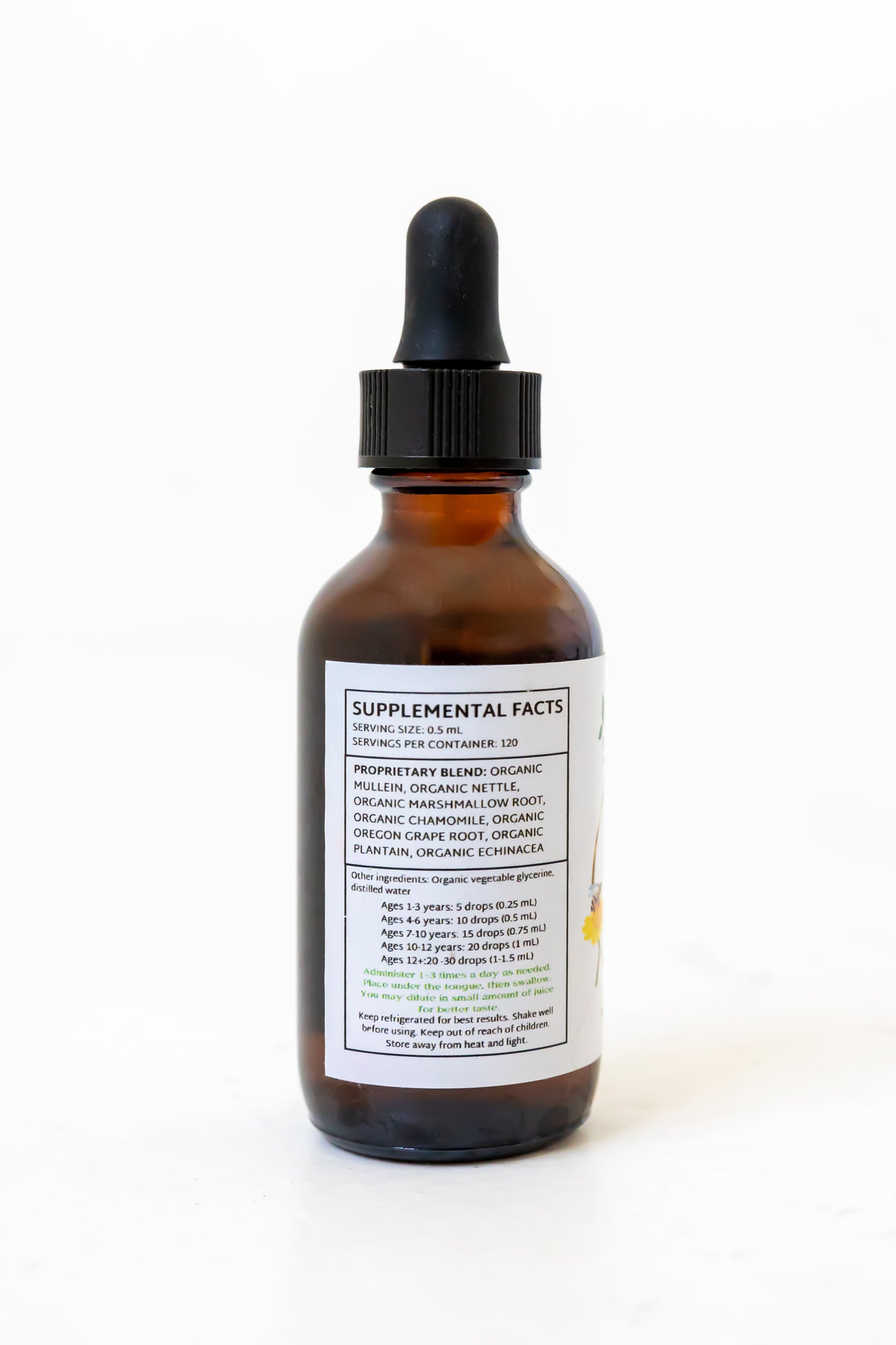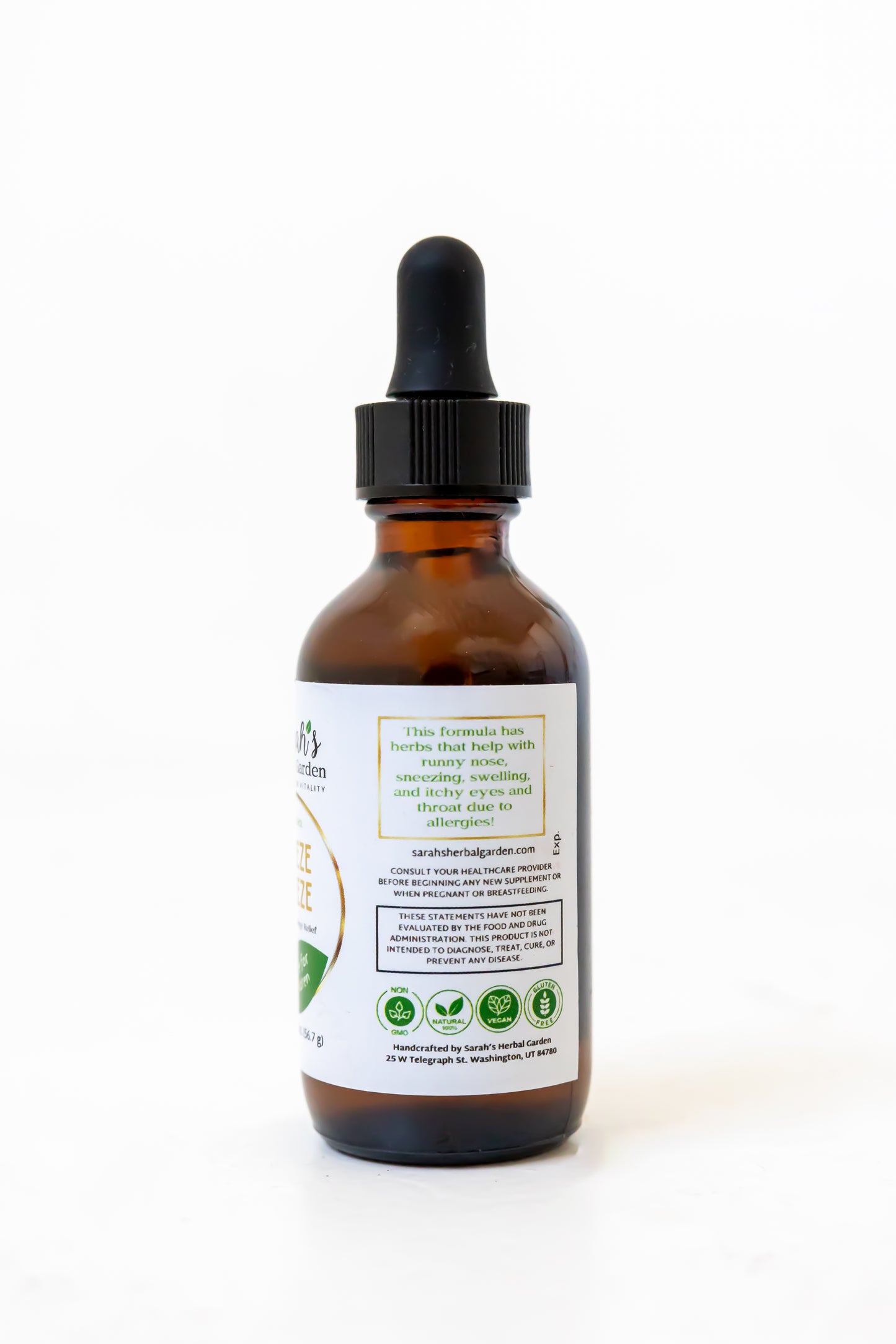Sarah's Herbal Garden
Sneeze Breeze {For Allergies}
Sneeze Breeze {For Allergies}
Couldn't load pickup availability
2 fl. oz. (113.4 g) Glycerite Tincture
This formula contains herbs that can help reduce seasonal discomforts such as sneezing, runny nose, respiratory congestion, itchy throat, and more.
Herbs can be a powerful and natural way to help manage seasonal discomforts by supporting the immune system, reducing inflammation, and calming histamine reactions. They can support the respiratory system by soothing lung tissue and help remove mucous. They also have anti-microbial and anti-fungal properties.
Warning: Because the herbs in this formula could interact with other medications typically prescribed for attention deficit, it is important to consult with the child's primary healthcare expert before beginning herbal supplementation.
These statements have not been evaluated by the Food and Drug Administration. This product is not intended to diagnose, treat, cure, or prevent any disease. Consult with healthcare provider if pregnant or breastfeeding, have an underlying health conditions, beginning an herbal supplement for the first time, or are taking other medications.
Share



Herbs used in this formula

Mullein
Mullein (Verbascum thapsus) is a traditional herb known for its ability to support respiratory health and relieve allergy symptoms. With its soothing, anti-inflammatory, and expectorant properties, mullein can be especially helpful for those experiencing respiratory allergies. Here’s how mullein can assist with allergies:
1. Soothes Respiratory Passages
- Calms Mucous Membranes: Mullein is gentle on the mucous membranes of the respiratory tract, helping to reduce irritation in the nose, throat, and lungs caused by allergens. This can be especially helpful for individuals with allergies that cause coughing, sneezing, or throat irritation.
- Reduces Throat Irritation: Mullein’s naturally soothing properties can ease the itching or scratchiness in the throat that often accompanies allergic reactions.
2. Acts as a Natural Expectorant
- Clears Mucus: Mullein is an effective expectorant, meaning it helps to thin and expel mucus from the respiratory system. For allergy sufferers with a buildup of mucus due to congestion or postnasal drip, mullein can make breathing easier by helping clear blocked airways.
- Eases Chest Congestion: By loosening mucus, mullein helps relieve chest congestion associated with allergic reactions, reducing coughing and promoting easier breathing.
3. Reduces Inflammation
- Anti-Inflammatory Properties: Mullein contains compounds like saponins and flavonoids, which have anti-inflammatory effects. This helps reduce inflammation in the respiratory tract, making it easier for allergy sufferers to breathe and reducing discomfort caused by inflamed airways.
- Relieves Sinus Pressure: By reducing inflammation, mullein can help alleviate sinus congestion and pressure, common symptoms in seasonal allergies.
4. Supports Immune Health
- Antimicrobial Properties: Mullein has mild antimicrobial effects, which help prevent secondary respiratory infections that can sometimes follow severe allergies. This makes mullein a supportive herb for those experiencing prolonged allergy symptoms or respiratory discomfort.
- Boosts Immune Response: Mullein’s immune-boosting properties can support the body in fighting off allergens and reducing the frequency and severity of allergic responses.
5. Relieves Allergy-Induced Asthma Symptoms
- Bronchodilator Effects: Mullein is traditionally used to help open up the airways and support breathing, which can be beneficial for those with allergy-induced asthma. It may help reduce wheezing and shortness of breath, making it easier to manage respiratory symptoms.
Stinging Nettle
Stinging nettle (Urtica dioica) is a popular natural remedy for managing allergy symptoms, particularly those associated with hay fever and seasonal allergies. Known for its natural antihistamine properties and anti-inflammatory effects, nettle can provide relief from sneezing, itching, and congestion. Here’s how nettle helps with allergies:
1. Acts as a Natural Antihistamine
- Inhibits Histamine Production: Nettle helps block the release of histamines, which are the compounds that trigger allergic reactions like sneezing, itching, and watery eyes. By reducing histamine production, nettle can lessen the intensity of allergy symptoms.
- Provides Non-Drowsy Relief: Unlike many over-the-counter antihistamines, nettle does not cause drowsiness, making it a preferred choice for those looking for a natural alternative without sedative side effects.
2. Reduces Inflammation
- Anti-Inflammatory Properties: Nettle contains anti-inflammatory compounds like quercetin and caffeic acid, which help reduce inflammation in the nasal passages, throat, and respiratory system. This can ease sinus congestion and swelling, making breathing easier and relieving pressure.
- Soothes Irritated Tissues: Nettle’s anti-inflammatory effects can soothe the inflamed tissues that often accompany allergies, such as red, itchy eyes or an irritated throat.
3. Supports Immune Health
- Rich in Antioxidants: Nettle is packed with antioxidants, including vitamin C and flavonoids, which help strengthen the immune system and reduce the impact of environmental allergens.
- Immune Modulation: Nettle is thought to have immune-modulating effects, meaning it can help balance immune responses, making the body less reactive to common allergens like pollen or dust.
4. Relieves Respiratory Symptoms
- Clears Mucus and Congestion: Nettle helps reduce mucus production and can thin mucus in the respiratory tract, which helps relieve congestion and postnasal drip, common symptoms of seasonal allergies.
- Supports Sinus Health: By reducing nasal and sinus inflammation, nettle can alleviate pressure and congestion, making it easier to breathe and providing relief from sinus headaches.
5. Provides Nutritional Support
- Nutrient-Rich: Nettle is rich in vitamins and minerals, including vitamin A, vitamin C, iron, and magnesium, all of which support overall health and may help the body better handle allergens.
- Boosts Energy Levels: The nutrient profile of nettle can help reduce fatigue and boost energy, which is especially helpful when allergies lead to exhaustion.
Marshmallow Root
Marshmallow root (Althaea officinalis) is a soothing herb traditionally used for its ability to relieve irritation and inflammation in the respiratory and digestive systems. During allergy season, marshmallow root can be especially helpful for alleviating symptoms like a sore throat, dry cough, and irritated mucous membranes. Here’s how marshmallow root supports allergy relief:
1. Soothes Irritated Mucous Membranes
- High Mucilage Content: Marshmallow root is rich in mucilage, a gel-like substance that coats and soothes the mucous membranes lining the throat, nose, and respiratory passages. This protective coating helps reduce irritation and provides relief from symptoms like a scratchy or sore throat often associated with allergies.
- Eases Dry Cough: The mucilage in marshmallow root can help calm a dry, persistent cough, which is common in respiratory allergies. It provides a soothing layer that reduces the urge to cough and helps prevent further irritation of the throat.
2. Reduces Inflammation
- Anti-Inflammatory Properties: Marshmallow root contains compounds like flavonoids that help reduce inflammation in the respiratory and digestive tracts. This is especially beneficial for those experiencing swollen nasal passages, sore throats, or sinus inflammation caused by seasonal allergies.
- Calms Swollen Tissues: By reducing inflammation, marshmallow root can relieve pressure in the sinuses, making it easier to breathe and alleviating sinus headaches and congestion associated with allergic reactions.
3. Moisturizes Dry Tissues
- Supports Hydration: The mucilage in marshmallow root helps retain moisture in the mucous membranes, which can dry out due to allergies, weather, or excessive antihistamine use. This moisture retention helps reduce dryness in the nasal passages and throat, providing comfort and preventing cracking or bleeding.
- Relieves Itchiness: Marshmallow root’s hydrating properties also help relieve itchy eyes and an itchy nose, which are common symptoms of seasonal allergies.
4. Acts as a Gentle Expectorant
- Clears Mucus: While it primarily soothes and hydrates, marshmallow root also acts as a mild expectorant, helping to loosen and clear excess mucus from the respiratory tract. This can be helpful for allergy sufferers who experience postnasal drip or mucus buildup in the throat and chest.
- Eases Congestion: By promoting mucus clearance, marshmallow root can reduce nasal and chest congestion, making it easier to breathe and helping to prevent further irritation.
5. Supports the Immune System
- Rich in Antioxidants: Marshmallow root contains antioxidants that help protect cells from oxidative stress. During allergy season, these antioxidants can support immune function and help the body respond more effectively to allergens.
- May Help Modulate Immune Response: By supporting the immune system’s balance, marshmallow root can help reduce overly reactive responses to environmental triggers, such as pollen or dust.
Chamomile
Chamomile (Matricaria chamomilla or Chamaemelum nobile) is a gentle herb widely known for its soothing, anti-inflammatory, and antihistamine properties, making it particularly helpful in managing allergy symptoms. Here’s how chamomile can provide relief from seasonal and environmental allergies:
Natural Antihistamine Properties
- Reduces Histamine Response: Chamomile contains apigenin, a natural compound with antihistamine effects that can help inhibit the release of histamines in the body. By reducing histamine release, chamomile helps lessen symptoms like sneezing, itching, and watery eyes that are commonly triggered by allergens.
- Prevents Overreaction: Chamomile’s mild antihistamine action helps prevent the body from overreacting to allergens, making it a helpful herb for reducing allergy sensitivity without the sedative effects often associated with over-the-counter antihistamines.
Reduces Inflammation
- Anti-Inflammatory Compounds: Chamomile contains bisabolol and chamazulene, two anti-inflammatory compounds that can soothe inflammation in the respiratory tract. This helps reduce symptoms like sinus pressure, swollen nasal passages, and irritated eyes.
- Eases Respiratory Discomfort: By reducing inflammation in the nasal passages and throat, chamomile can help relieve congestion, making it easier to breathe and alleviating the discomfort caused by allergies.
Supports Respiratory Health
- Opens Airways: Drinking chamomile tea or inhaling chamomile steam can help open up the respiratory passages, making it easier to breathe during allergy season. This is particularly useful for individuals with allergic rhinitis or hay fever.
- Clears Sinuses: Chamomile’s soothing properties can help reduce sinus pressure and promote mucus clearance, providing relief from congestion associated with allergies.
Relieves Anxiety and Improves Sleep
- Promotes Relaxation: Allergies can often lead to restlessness and disrupted sleep, especially with symptoms like itchy skin, congestion, or coughing. Chamomile’s calming properties help reduce stress and anxiety, promoting a sense of relaxation and easing sleep.
- Improves Sleep Quality: Drinking chamomile tea before bed can help allergy sufferers get better sleep, which supports the immune system and may help the body respond more effectively to allergens.
Oregon Grape Root
Oregon grape root (Mahonia aquifolium) is an herb traditionally used for its antimicrobial, anti-inflammatory, and immune-supporting properties, which can be beneficial for managing certain allergy symptoms. Here’s how Oregon grape root may help with allergies:
1. Reduces Inflammation
- Anti-Inflammatory Compounds: Oregon grape root contains berberine, a compound with strong anti-inflammatory properties that helps reduce swelling and irritation in the body. This can be particularly helpful for calming inflamed sinuses, nasal passages, and skin affected by allergic reactions.
- Eases Respiratory Discomfort: By reducing inflammation in the respiratory system, Oregon grape root may help ease symptoms such as congestion, sinus pressure, and inflamed airways, making it easier to breathe.
2. Supports Immune Health
- Enhances Immune Function: Oregon grape root’s berberine content helps modulate immune responses, supporting the body’s ability to fight off allergens and reducing the likelihood of overreacting to common environmental triggers. This immune modulation can help minimize the severity of allergy symptoms.
- Antimicrobial Effects: In cases where allergies lead to sinus infections or other secondary infections, Oregon grape root’s antimicrobial properties can help prevent or manage these infections, providing additional respiratory relief.
3. Aids in Skin Allergy Relief
- Soothes Skin Irritation: Oregon grape root is commonly used for managing skin conditions like eczema, psoriasis, and allergic dermatitis, as it helps reduce itching, redness, and irritation. These soothing effects can be beneficial for individuals who experience rashes or hives as part of their allergic response.
- Promotes Healing: Topical application of Oregon grape root extract may help speed up the healing process for inflamed or irritated skin, reducing symptoms of allergic skin reactions.
4. Helps with Detoxification
- Liver Support: Oregon grape root is known to support liver function, which can be beneficial during allergy season. A well-functioning liver helps filter out allergens and toxins from the bloodstream, preventing an overload on the immune system and potentially reducing allergic responses.
- Assists in Cleansing: By supporting liver health and detoxification, Oregon grape root helps the body more effectively process and eliminate substances that may contribute to allergy symptoms.
5. Acts as a Natural Antihistamine
- Histamine Regulation: While not a direct antihistamine, Oregon grape root’s immune-supporting and anti-inflammatory properties may help regulate histamine release, reducing the intensity of histamine-triggered symptoms such as itching, sneezing, and watery eyes.
Plantain
Plantain (Plantago major or Plantago lanceolata) is a common herb with a range of medicinal uses, particularly for soothing inflammation and irritation in the respiratory and digestive systems. Known for its anti-inflammatory, antihistamine, and mucilage-rich properties, plantain can be especially helpful for managing allergy symptoms. Here’s how plantain helps with allergies:
1. Natural Antihistamine Effects
- Reduces Histamine Release: Plantain contains compounds that act as natural antihistamines, helping to reduce the body’s histamine response to allergens. This can help minimize symptoms like sneezing, itching, and watery eyes, which are commonly triggered by histamine release during allergic reactions.
- Calms Allergic Responses: By regulating histamine release, plantain can help prevent the body from overreacting to allergens, providing a more balanced immune response.
2. Soothes Inflamed Respiratory Passages
- Mucilage Content: Plantain is rich in mucilage, a gel-like substance that coats and soothes the mucous membranes in the respiratory tract. This can be especially helpful for easing a sore or itchy throat, dry cough, and other respiratory irritations caused by allergies.
- Reduces Inflammation in the Airways: Plantain’s anti-inflammatory properties help reduce swelling in the nasal passages and throat, easing symptoms like congestion, sinus pressure, and an irritated throat, which often accompany respiratory allergies.
3. Relieves Nasal and Sinus Congestion
- Clears Mucus: Plantain has mild expectorant properties that help clear mucus from the respiratory tract. This can be helpful for people with allergies who experience postnasal drip or excessive mucus buildup, providing relief from congestion and promoting easier breathing.
- Reduces Sinus Swelling: By reducing inflammation and soothing mucous membranes, plantain can relieve sinus pressure and swelling, which can reduce headaches and make breathing easier.
4. Calms Skin Allergies and Irritation
- Soothes Itchy, Irritated Skin: Plantain’s anti-inflammatory and skin-soothing properties make it effective for managing allergic skin reactions like rashes, hives, or eczema. The plant’s compounds can help reduce redness, itching, and swelling.
- Promotes Skin Healing: Plantain also has wound-healing properties that help the skin recover from allergic reactions. Applied topically, plantain can promote faster healing of irritated skin, making it a good remedy for contact dermatitis or other skin allergies.
5. Supports Immune Health
- Boosts Immune Function: Plantain’s antioxidant properties help protect cells from damage and support a healthy immune system, which is important during allergy season. By supporting immune health, plantain can reduce the severity of allergic responses.
- Reduces Overactivity: As an immune-modulating herb, plantain helps balance immune responses, which can be helpful for those who have overly sensitive reactions to common allergens.
Echinacea
Echinacea (Echinacea purpurea or Echinacea angustifolia) is best known for its immune-boosting properties and is often used to help the body fight off infections like the common cold. When it comes to allergies, echinacea can also play a supportive role by modulating the immune response, reducing inflammation, and preventing secondary infections. Here’s how echinacea can help manage allergy symptoms:
1. Supports Immune System Modulation
- Balances Immune Responses: Echinacea contains compounds such as polysaccharides, alkamides, and flavonoids, which help modulate immune function. By balancing the immune response, echinacea may reduce the body’s sensitivity to allergens and prevent it from overreacting to environmental triggers like pollen, dust, or pet dander.
- Prevents Immune Overactivity: For individuals with allergies, the immune system often overreacts to harmless substances. Echinacea can help bring the immune system back to a balanced state, reducing the severity of allergy symptoms.
2. Anti-Inflammatory Effects
- Reduces Inflammation: Echinacea’s anti-inflammatory properties, especially from its alkamides, help calm the inflammation in the respiratory system, which is common in allergies. This can alleviate symptoms like nasal congestion, sinus pressure, and throat irritation, making it easier to breathe and reducing overall discomfort.
- Soothes Irritated Tissues: Echinacea can help reduce the irritation in mucous membranes, such as the nasal passages and throat, that often occurs with allergic reactions. This soothing effect can relieve symptoms like itching and scratchiness.
3. Prevents Secondary Infections
- Antimicrobial Properties: Echinacea has natural antimicrobial effects that can help prevent secondary infections. Allergy symptoms, like a runny nose or postnasal drip, can create a favorable environment for bacteria, potentially leading to sinus infections or bronchitis. By supporting the body’s defenses, echinacea helps reduce the risk of these complications.
- Boosts Respiratory Health: By preventing infections in the respiratory tract, echinacea can help allergy sufferers avoid worsening symptoms or additional discomfort associated with secondary infections.
4. Antioxidant Benefits
- Rich in Antioxidants: Echinacea is high in antioxidants, including flavonoids, which help protect cells from oxidative stress. During allergy season, the immune system can become taxed, and echinacea’s antioxidants help reduce cellular damage, supporting a healthier immune response.
- Reduces Histamine-Related Damage: Echinacea’s antioxidants can also help mitigate the effects of histamine release, which can lead to cell damage and inflammation. By protecting against oxidative stress, echinacea aids in reducing some of the negative effects of histamine.
5. Helps with Skin Allergies
- Reduces Skin Inflammation: Echinacea can also be beneficial for those who experience skin allergies. It can help reduce inflammation, redness, and irritation in skin reactions like eczema, hives, or contact dermatitis.
You'll love our other child-safe remedies!
-
Elderberry Immune {Immune Boosting Tincture}
Regular price From $25.00 USDRegular priceUnit price / per -
Feel Better {General Wellness Support for Babies and Children}
Regular price $39.00 USDRegular priceUnit price / per -
Cough Tincture
Regular price From $25.00 USDRegular priceUnit price / per -
Brain Friend {For ADHD, sleep disturbances, depression and anxiety in children}
Regular price $25.00 USDRegular priceUnit price / per







